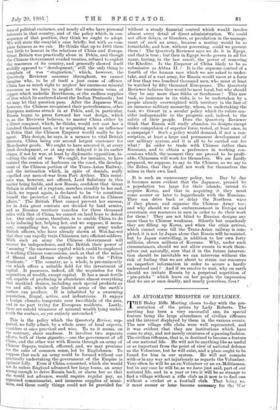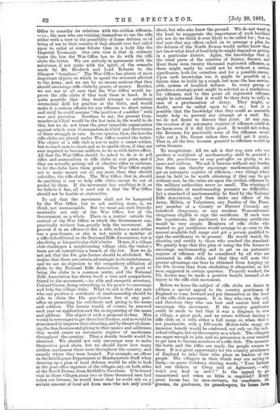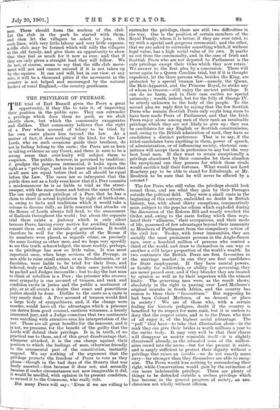AN AUTOMATIC REGISTER OF RIFLEMEN.
THE Bisley Rifle Meeting closes to-day with the pre- sentation of the prizes by Lady Roberts. The meeting has been a very successful one, its special feature being the large attendance of civilian riflemen and. the interest displayed by them in the various events. The new village rifle clubs were well represented, and. it was evident that they are institutions which have come to stay, and. not merely creatures of a passing fashion. The civilian rifleman, that is, is destined to become a feature of our national life. He will not be anything like as useful or as important from the point of view of national defence as the Volunteer, but he will exist, and a place ought to be found for him in our system. He will not compete with or in any way act injuriously as regards the Volunteer. Very often he will be an ex-Volunteer or an ex-Militiaman, but in any case he will be, as we have just said, part of our national life, and in a year or two it will be as strange to find a village without a rifle club as it now is to find one without a cricket or a football club. That king so. it must sooner or later become necessary for th3 War Office to consider its relations with the civilian riflemen, —i.e., the men who are training themselves to use the rifle either with a view to the possibility of home defence, or of being of use to their country if they should ever feel called upon to enlist at some future time in a body like the Imperial Yeomanry. Our own view is that in ordinary times the less the War Office has to do with the rifle clubs the better. We are entirely in agreement with the substance, if not quite with the spirit, of the remarks made by Mr. Brodrick and Lord Roberts to the Glasgow "burghers." The War Office has plenty of most important objects on which to spend the revenues allotted to the Army, and we are by no means anxious that they should encourage rifle clubs by grants of money. Besides, we are not at all sure that the War Office would im- prove the rifle clubs if they took them in hand. It is quite possible that they would attempt to substitute ceremonial drill for practice at the butts, and would make it a serious offence for any rifleman to shoot unless and until he could assume "the position of a soldier" with ease and precision. Needless to say, the present Com- mander-in-Chief would be the last man in the world to do this, but we do not trust the great immobile organisation against which even Commanders-in-Chief and Secretaries of State struggle in vain. In our opinion, then, the less the rifle clubs are plated under War Office control the better. The object of a rifle club is not to make a smart soldier, but to teach men to shoot and so to enable them, if they are ever required to become soldiers, to do so with better effect. Ali that the War Office should be asked to do is to sell rifles and ammunition to rifle clubs at cost price, and if they are actually getting rid of obsolete rifles or carbines, to let the clubs have them gratis. The War Office ought not to make money out of, any more than they should subsidise, the rifle clubs. The War Office, that is, should do anything it can to help rifle clubs, except be out of pocket by them. If the movement has anything in it, as we believe it has, all it need ask is that the Wax Office should not be hostile or obstructive.
To ask that the movement shall not be hampered by the War Office, but to ask nothing more, is, we think, not unreasonable. But we must ask such friendly neutrality not only of the War Office, but of the Government as a whole. There is a matter outside the control of the War Office in which the Government can, practically without loss, greatly help the movement. At present it is an offence to fire a rifle, unless a man either has a gun-license, or else is not merely a member of a rifle club affiliated to the National Rifle Association, but is also firing at his particular club's butts. Hence, if a village club challenges a neighbouring village club, the visitor's team are all committing a breach of the law. Now we do not ask that the 10s. gun-license should be abolished. We realise that there are certain advantages in its maintenance, and we see no objection to the compulsory affiliation of clubs to the National Rifle Association. It is good to bring the clubs to a common centre, and the National Rifle Association has shown itself a true and sympathetic friend to the movement,—its able and energetic secretary, Colonel Crosse, doing everything in his power to encourage and help the village clubs. What we ask is that any man who can produce a certificate of marksmanship should be able to claim the 10s. gun-license free at any post- office on presenting his certificate and giving in his name and address. The license would, of course, be renewed each year on application and the re-registering of the name and address. The object of such a proposal is clear. Men would be very eager to get these free licenses, and so would be stimulated to improve their shooting, and by the act of claim- ing the free licenses and giving in their names and addresses they would create an automatic register of marksmen throughout the country. Thus a double benefit would be obtained. We should not only encourage men to make themselves good shots, but we should know how many civilian marksmen there were throughout the country, and exactly where they were located. For example, an officer in the Intelligence Department or Headquarters Staff when drawing up a plan of local defence would be able to look at the post-office registers of the villages, say, on both sides of the North Downs, from Redhill to Farnham. If he found that in those villages some two or three thousand men had taken out licenses, he would 'mow that he could rely on a certain amount of local aid from men who not only could shoot, but who also blew the ground. We do not want the least to exaggerate the importance of such localised aid, nor do we think it ever likely to be called for; but Nye feel sure that any officer called on to arrange a plan for the defence of the North Downs would rather know than not know what kind of local help he might depend on getting in a particular district. Again, the knowledge that le the rural parts of the counties of Surrey, Sussex, and Kent there were twenty thousand registered riflemen, as there might easily be, could not be without a certain significance, both for ourselves and for a possible enemy. Upon such knowledge too, it might be possible at a future time to build up a rough, but none the less service. able, system of localised defence. In every group of parishes a strategic point might be selected as a rendezvous for riflemen, and, to this point all registered riflemen might be informed that it would be their duty to rally in case of a proclamation of Array. They might, ne doubt, never be called upon to do so ; but it is possible that the knowledge that they could so assemble might help to prevent any attempt at a raid. But we do not desire to discuss that point. At any rate, the creation of an automatic register of riflemen could do no harm even if it did little good. It would not reduce the Revenue, for practically none of the riflemen would take out a 10s. license unless they could get it gratis. That is, all the free licenses granted to riflemen would U8 extra licenses.
To recapitulate: All we ask is that any man who can produce a certificate of marksmanship shall be granted a free 108. gun-license at any post-office on giving in his name and address. We ask it bemuse without any burden the State can thereby encourage marksmanship, and get an automatic register of riflemen,—two things which must be held to be worth obtaining if they can be got without cost, be the value set upon the civilian riflemen by the military authorities never so small. The winning of the certificate of marksmanship presents no difficulties. Let a standard of marksmanship be fixed by the National Rifle Association, and then make any officer of the Army, Militia, or Volunteers, any Justice of the Peace, any member of a County or District Council, any beneficed clergyman, or any resident Nonconformist clergyman eligible to sign the certificate. If such were the regulations, the machinery for obtaining certificates would be very simple. Members of rifle clubs who wanted to get certificates would arrange to go over to the nearest available full range and get a person qualified to sign the certificates to be present. He would watch the shooting and certify to those who reached the standard. We greatly hope that this plan of using the 10s. license to encourage marksmanship and to get us an automatic register of riflemen will be considered by all who are interested in rifle clubs, and that they will note that greater advantage can thus be obtained from keeping up the 10s. license than from abolishing it altogether, as has been suggested in certain quarters. Properly worked, the 10s. license may be made a positive benefit instead of an injury to the rifle club movement.
Before we leave the subject of rifle clubs we desire to address a special appeal to the country gentlemen of England to come forward and put themselves at the head of the rifle club movement. It is they who own the soil, and therefore they who can best and easiest lead and encourage this movement. If the country gentlemen could be made to feel that it was a disgrace to own a village, a great park, and an estate without having a rifle club on it with either a full range or, when that is not practicable, with a 100-yards Morris-tube range, an immense benefit would be conferred, not only on the indi- vidual villages, but on the country as a whole. The villagers are eager enough to join, and no persuasion is ever wanted to get men to become members of a rifle club. The moment the butts and the rifles are ready, the people swarm to them. It is a great opportunity for the country gentlemen of England to take their true place as leaders of the people. The villagers in their dumb way are saying them,—to quote Cobden's stirring words," Your fathers led our fathers at Crecy and at Agincourt, —why won't you lead us now ? " Is the appeal to go unanswered and when so little is required? Every great house has its men-servants, its coachmen, its grooms, its gardeners, its gamekeepers, its home farm men. These should form the nucleus of the club. Let the club in the park be started with them, and then let the villagers be asked to join. On such lines, with very little labour and very little expense, a rifle club may be formed which will rally the villagers to the old family, and give them an opportunity to show that they feel as much for it now as ever, and that if they are only given a straight lead they will follow. We do not, of course, mean to say that the rifle dub move- ment will not and cannot succeed if it is not taken up by the squires. It can and will, but in our view, at any rate, it will be a thousand pities if the movement in the country is not helped and, encouraged by the natural leaders of rural England,—the country gentlemen.




































 Previous page
Previous page